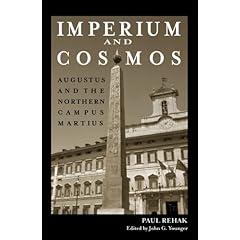
When I read the product description of this book by Paul Rehak, scheduled for release April 8, I was pleased to see that someone besides me thinks Augustus was not as interested in being viewed as a modest citizen as many historians have suggested. I just returned from Rome a few weeks ago and while there had a chance to view the new rooms of the villa of Augustus on the Palatine that have been recently restored and saw nothing "modest" about them. They were as richly frescoed as most sumptuous villas of the wealthy that have been unearthed in Pompeii or Oplontis. You also can't help but be awestruck by the ornate naturalistic murals of a subterranean room from the villa of Livia recreated in a gallery of the National Museum in Rome either. Each time I see them I feel they envelope a visitor in a sense of luxury as real as if you were left to stroll in a richly planted peristyle garden.
"Caesar Augustus promoted a modest image of himself as the first among equals (princeps), a characterization that was as recognized with the ancient Romans as it is with many scholars today. Paul Rehak argues against this impression of humility and suggests that, like the monarchs of the Hellenistic age, Augustus sought immortality—an eternal glory gained through deliberate planning for his niche in history while flexing his existing power. Imperium and Cosmos focuses on Augustus’s Mausoleum and Ustrinum (site of his cremation), the Horologium-Solarium (a colossal sundial), and the Ara Pacis (Altar to Augustan Peace), all of which transformed the northern Campus Martius into a tribute to his major achievements in life and a vast memorial for his deification after death.
Rehak closely examines the artistic imagery on these monuments, providing numerous illustrations, tables, and charts. In an analysis firmly contextualized by a thorough discussion of the earlier models and motifs that inspired these Augustan monuments, Rehak shows how the princeps used these on such an unprecedented scale as to truly elevate himself above the common citizen. "
No comments:
Post a Comment